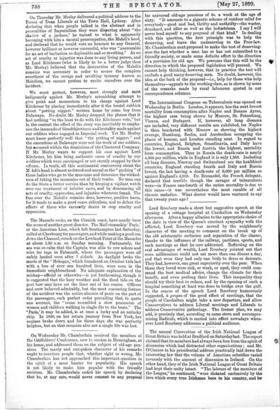On Wednesday Mr. Chamberlain received the members of the Oddfellows'
Conference, now in session in Birmingham, at his house, and addressed them on the subject of old-age pen- sions. The manly and outspoken character of his remarks ought to convince people that, whether right or wrong, Mr. Chamberlain has not approached this important question in the spirit of a mere hunter for popularity. His speech is not likely to make him popular with the friendly societies. Mr. Chamberlain ended his speech by declaring that he, at any rate, would never consent to any proposal for universal old-age pensions of 5s. a week at the age of sixty. "It amounts to a gigantic scheme of outdoor relief for everybody—good and bad, thrifty and unthrifty—the waster, drunkard, and idler as well as the industrious. I say I will never lend myself to any proposal of that kind." In dealing with this question, the first principle was to help the deserving, and leave the undeserving to the Poor-law. Mr. Chamberlain next proposed to make the test of deserving- ness the fact whether a man has or has not subscribed to a friendly society, or made some definite effort in the direction of a provision for old age. We presume that this will be the direction in which the proposed legislation will proceed. We cannot help thinking, however, that in practice the test will exclude a good many deserving men. No doubt, however, the idea at the back of the proposal—i.e., help for those who help themselves—appeals to the working class, as is shown by some of the remarks made by rural labourers quoted in our correspondence columns.






































 Previous page
Previous page